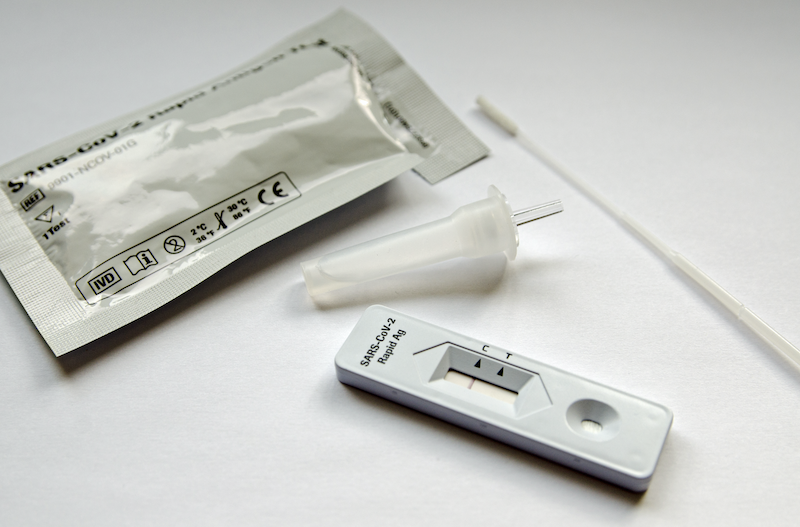


Young teachers and education staff who have not received both of their covid jabs yet fear that they are being treated as “collateral damage” by Government.
On Sunday, the Government announced that all direct contacts would no longer have to quarantine if they had no symptoms and provided that they agreed to covid testing and isolation if they get a positive result.
It came after whole year groups at schools were told they would have to isolate over the weekend, while Grainville told parents and guardians that its staffing situation had become so “critical” due to contact tracing that one year group would have to stay home per day this week.
While the changes have undone much of the classroom disruption, teaching unions are saying that they have left younger staff who have not had the opportunity to get both doses of the vaccine severely disadvantaged.
With a third of teachers aged 20 to 39 and having received only one dose of the vaccine, Jersey NEU (National Education Union) Secretary Tim Balston said teachers and teaching assistants are concerned about potentially spreading the virus to their “young charges” but also about being in the same room as up to 30 children who may be carrying the virus.
In the past two weeks, 82 pupils have tested positive for covid and nine staff - of those, 53 students tested positive last week alone, and seven staff.
“Despite all the protestations, firstly that children don’t get covid, changed to they don’t spread it, to they don’t get it seriously etc, there is still much that is not known about the virus,” Mr Balston explained.
“There would seem to be a significant number of young people now testing positive and it is unclear whether this is solely driven from contacts at home or from each other. Might they spread the virus to young teachers?”
Having noted that part of the issue with covid among younger people is that “you don’t know when the virus will suck the life out of you”, Mr Balston went on to say: “Yes, there are mitigations that have been put in place by the hardworking Education Department and the overworked Headteachers, but the risk, or gamble, is that they may not be working as effectively as those who are not familiar with the school setting believe.”
He also questioned whether the schools testing regimes - both lateral flow for students and PCR workforce screenings - were enough at present and whether it could be stepped up.

Pictured: Discussions are underway about whether lateral flow testing could be extended to younger secondary school year groups.
Mr Balston said the union was disappointed that it didn’t have the chance to raise any of these concerns with Government in advance of the direct contact policy being announced in a press conference at 19:00.
It was only at 20:00 that a meeting was held with headteachers, and at 20:30 that unions were updated.
“For the second time within a week, the Union knew nothing about the changes that were to be imposed until announced by the media and the Government’s Facebook page. There had been no opportunity to make a comment, discuss or pose questions beforehand. A fait accompli meeting was held after the event, but this was not about consultation: once the Ministers have made a decision they never, ever go back on it!” Mr Balston said.
“So much for ‘working with the Unions’ that the Government often wants to claim.”
He said the overall impression was that the decision had been made hastily, likely due to the breakdown of the contact tracing system, adding: “A strange way to operate: reactive and not proactive. They had already told us the numbers would rise, but didn’t seem particularly ready for the consequences.”
Mr Balston continued: “While the Government will claim, quite rightly, that they are acting proportionately and aiming to provide a balanced reconnection, members who have worked tirelessly throughout the pandemic are concerned that they are not often considered and are seen as collateral damage. This is as much about perception as reality, with communication often ignoring the concerns of members. Much has been made of keeping the schools open at all costs. But what has been the cost to school staff?”
When Express asked the Chief Minister whether the vulnerabilities of younger teaching staff, who are not fully vaccinated, had been considered ahead of the direct contact policy change, he said that they had not been considered as a specific demographic, but in the context of younger people’s reactions to covid.
“The impact on individuals as a result of covid is very much age is a factor – the younger the age group. the less impact is expected i.e. it should be a mild impact,” he said, going on to emphasise that the Government has been “encouraging everyone 18 and above to get the vaccine.”

Pictured: The Chief Minister said the decision-making largely revolved around the fact that younger people are less likely to become seriously ill with the virus.
While unions didn’t have the chance to contribute to discussions, the chief Minister said that Education Minister Scott Wickenden attended a Competent Authorities Ministers meeting on Sunday afternoon, which followed an earlier meeting of senior civil servants on Saturday, including the Director General.
He said the policy change “recognis[ed] the disruption” faced by schools, adding: “On the overall balance of harms, balance of risks – we’ve all been very clear that we have to support children… Children and education have been very high on our priority list all the way through.”
During Sunday’s press conference, Acting Medical Officer of Health Dr Ivan Muscat MBE said there was a possibility that lateral flow testing could be extended to more, younger year groups in secondary schools.
However, he noted that the Government had to first get resources in place for this.
Elsewhere in the conference, he confirmed that 251 covid cases at the time were under-30s: 155 in the 10 to 19 age group, and 96 in the 20 to 29-year-olds, with "one or two" under-9s.
In a statement yesterday, Reform Jersey questioned the direct contact change and its impact on children.
"Children are not vaccinated. Although it appears that they suffer least from Covid infection, there is little data or certainty over the long term impacts of even mild infection on this age group," they said.
"It does appear that the government is pursuing a 'herd immunity' approach for children. The Government of Jersey needs to be transparent about this and give clarity over the final expected outcomes of allowing children to be widely exposed to covid."
Turning to those working in environments like teaching and childcare, they continued: "Most young adults have not been fully vaccinated, but may still be required to work in an environment where they are now more likely to encounter people who have covid, due to the relaxation in isolation requirements.
"There may now be many young adults working in front-line roles who could come into close contact with children who have been exposed to covid. The government must explain what measures are in place to protect these people, given that many of them will not have been vaccinated yet."
Comments
Comments on this story express the views of the commentator only, not Bailiwick Publishing. We are unable to guarantee the accuracy of any of those comments.